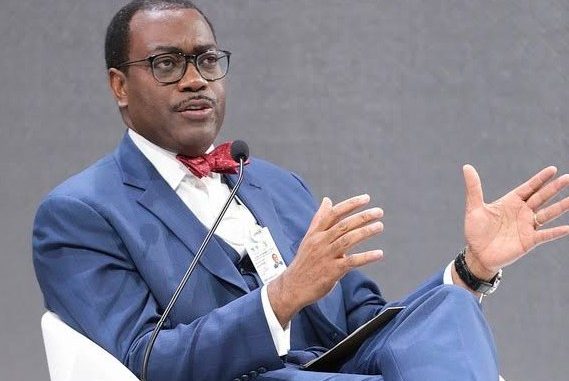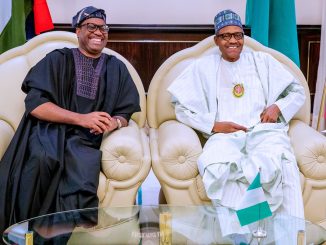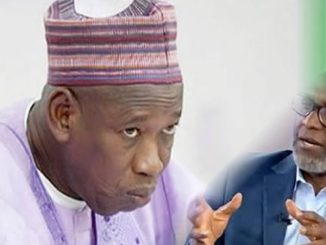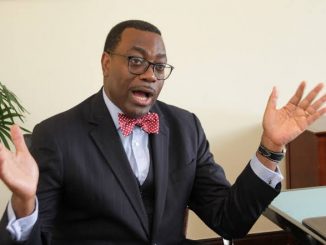
The president of the African Development Bank (AfDB) Akinwumi Adesina has pledged to continue working as he fought back against allegations of corruption and favouritism leveled against him.
Anonymous whistleblowers had accused Adesina of embezzlement, preferential treatment of Nigerians in senior appointments and promoting people accused or found guilty of fraud and corruption.
Adesina issued a press statement on Wednesday in which he strongly criticised what he termed “unprecedented attempts” to taint his reputation with accusations which have shaken the institution.
“I maintain my innocence with regard to trumped up allegations that unjustly seek to impugn my honour and integrity, as well as the reputation of the African Development Bank,” Adesina said.
“I am confident that fair, transparent and just processes that respect the rules, procedures and governance systems of the Bank, and rule of law, will ultimately prove that I have not violated the Code of Ethics of this extraordinary institution.”
Adesina’s response comes after the US Treasury Department wrote a letter urging the AfDB to carry out an independent investigation into the alleged ethics breaches by Adesina.
ALSO READ: ‘They killed him’, sister of US black man protests, mayor backs white policeman prosecution
However, an internal inquiry by the Bank’s Ethics Committee cleared Adesina of all charges prompting whistleblowers to demand an independent inquiry after their complaint did not appear to gain momentum.
Mnuchin said that a complete dismissal of allegations against Adesina without adequate investigation would taint the AfDB’s reputation at a critical point in time. He added that further inquiry was necessary to ensure the AfDB’s President had “broad support, confidence, and a clear mandate” from shareholders.
The 60-year-old has previously denied the allegations labeling them as an attempt to discredit him from seeking another term at the helm of Africa’s largest multilateral lender.
Adesina, formerly Nigeria’s Minister of Agriculture and Rural Development, was elected as the 8th President of the AfDB in 2015. He is the sole candidate in this year’s race at an annual general meeting scheduled for August.
The United States is the second largest shareholder of the AfDB with a 6.5 per cent stake behind Nigeria, Adesina’s home country, which has a nine per cent stake.
How it all began
After the whistleblowers’ allegations, an internal inquiry by the AfDB’s Ethics Committee cleared Adesina of all charges, but the U. S. Treasury Secretary Steven Mnuchin rejected plans by the African Development Bank’s board to end an investigation into its president, Adesina, and called for an independent probe into allegations against him.
In a letter dated May 22 and addressed to Niale Kaba, chairwoman of the bank’s board of governors, Mnuchin said the Treasury disagrees with findings by the bank’s ethics committee that “totally exonerated” Adesina. Kaba confirmed receipt of the document and declined further comment.
The intervention by the Treasury, the AfDB’s biggest non-African shareholder, comes two weeks after the ethics committee found no evidence to support allegations of favoritism by Adesina. The 60-year-old bank chief, who has repeatedly refuted the allegations, is the only candidate up for election as president at an annual general meeting scheduled for August.
“We have deep reservations about the integrity of the committee’s process,” Mnuchin said. “Instead, we urge you to initiate an in-depth investigation of the allegations using the services of an independent outside investigator of high professional standing.”
Boomberg said the U.S. Treasury didn’t immediately respond to an emailed request for comment.
Clear Mandate
Adesina was accused by a group of unidentified whistleblowers of handing contracts to acquaintances and appointing relatives to strategic positions at the Abidjan-based lender.
“Considering the scope, seriousness, and detail of these allegations against the sole candidate for bank leadership over the next five years, we believe that further inquiry is necessary to ensure that the AfDB’s president has broad support, confidence, and a clear mandate from shareholders,” Mnuchin said.
The U.S. has a 6.5% stake in the lender, the largest shareholding after Adesina’s home country of Nigeria as of November 2019, according to the AfDB’s website.
U.S. criticism of the bank’s internal processes follows comments by World Bank President David Malpass in February that multilateral lenders including the AfDB tend to provide loans too quickly, and, in the process, add to African nations’ debt problems. The bank rebutted the statements as “inaccurate and not fact-based.”
The AfDB is Africa’s biggest multilateral lender and has an AAA rating from Fitch Ratings, Moody’s Investors Service and S&P Global Ratings. Its shareholders are Africa’s 54 nations and 27 countries in the Americas, Europe, Middle East and Asia.
In March, the lender issued a $3 billion social bond to help African countries deal with the fallout from the coronavirus pandemic. Bids for the securities on the London money market exceeded $4.6 billion. The bank also launched a $10 billion crisis-response facility for African nations.




